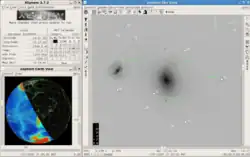 | |
| Developer(s) | Elwood C. Downey |
|---|---|
| Initial release | 1990 [1] |
| Stable release | 4.0.2[2]
/ February 28, 2021 |
| Repository | github |
| Written in | C and Motif |
| Operating system | Unix-like |
| Type | Planetarium software |
| License | MIT License |
| Website | github |
XEphem is a Motif based ephemeris and planetarium program for Unix-like operating systems developed by Elwood C. Downey.
History
XEphem started as a Unix and Motif conversion of the IBM PC-based ephem. It was initially released in December 1993 with version 2.5. Its commercial edition was discontinued in 2016; the free version continued to be offered as proprietary software.[3] In 2021, however, Downey relicensed XEphem's source code under the MIT License, raising the release version from 3.7.7 to 4.0.0 to highlight the change.[4]
Algorithms and models
XEphem uses
- The VSOP87D planetary theory (full and reduced precision) for Solar System ephemeris,
- Approximation to DE200[5] for the outer planets and Pluto, and
- Formulae from J. Meeus (1982)[6] for Jovian and Saturnian natural satellites
- Model by the Bureau des Longitudes for Martian and Uranian natural satellites
and includes
- About 452 million stars from both the Tycho-2 Catalogue and a magnitude limited subset of the Guide Star Catalog II,
- About 1 million deep sky objects mainly from a subset of HYPERLEDA,
- About 288,000 minor planets and comets orbital elements from the IAU Minor Planet Center and Lowell Observatory (that can be updated),
and other specialized catalogs. It also include the Digital Lunar Orbiter Photographic Atlas of the Moon.[7] XEphem is a client for Internet data sources such as the Digitized Sky Survey, Solar and Heliospheric Observatory, AAVSO light curves, and global temperature and cloud coverage. Through the Instrument Neutral Distributed Interface, XEphem can control some models of amateur telescopes, such as by Meade, Celestron, and Vixen, and auxiliary telescope components.
Catalogs
While the free version of XEphem only includes a subset of the SKYMAP Master Catalog and the Messier Catalog, the internal format of the remaining catalogs can be inferred from the source code, and e.g. the internal binary Tycho-2 catalog can be generated from the original data.[8] This is also possible for the non-stellar catalogs in the ASCII .edb format, such as for HYPERLEDA.[9]
XEphem can also read several astrometric catalogs in their original formats:
Numerical routines are used in PyEphem with permission of Elwood Downey.[14]
See also
- C2A
- Cartes du Ciel
- Celestia
- Digital Universe Atlas
- Google Mars
- Google Moon
- Google Sky
- Hallo Northern Sky (HN Sky)
- KStars
- NASA World Wind
- RedShift
- Starry Night
- Stellarium
- TheSky
- Universe Sandbox
- WinStars
- WorldWide Telescope
References
- ↑ "XEphem history". Retrieved 2015-09-28.
- ↑ Downey, Elwood (2021-02-28). "Xephem installation on Ubuntu 20.02". Groups.io. Archived from the original on 2021-05-29. Retrieved 2021-05-29.
- ↑ Downey, Elwood (2016-10-31). "thanks for using XEphem". Groups.io. Archived from the original on 2021-05-29. Retrieved 2021-05-29.
- ↑ Downey, Elwood (2021-02-07). "XEphem now released under MIT Open Source license". Groups.io. Archived from the original on 2021-05-29. Retrieved 2021-05-29.
- ↑ Chapront, J. (1995). "Representation of planetary ephemerides by frequency analysis. Application to the five outer planets". Astronomy and Astrophysics Supplement Series. 109: 181. Bibcode:1995A&AS..109..181C.
- ↑ J. Meeus, Astronomical Formulae for Calculators (Willmann-Bell, Richmond, VA, 1982).
- ↑ Digital Lunar Orbiter Photographic Atlas of the Moon
- ↑ see e.g. Programs to generate XEphem 3.4 xe2 catalogs
- ↑ CDS VizieR HYPERLEDA
- ↑ CDS VizieR Guide Star Catalog
- ↑ CDS VizieR GSC-ACT
- ↑ USNO PMM catalogs
- ↑ CDS VizieR UCAC2
- ↑ "PyEphem Home Page".
External links
- Official website
- XEphem on GitHub
- "openSUSE RPM". | "Linux RPMs".
- VanDevender, Steve. "Programs to generate XEphem 3.4 xe2 catalogs".